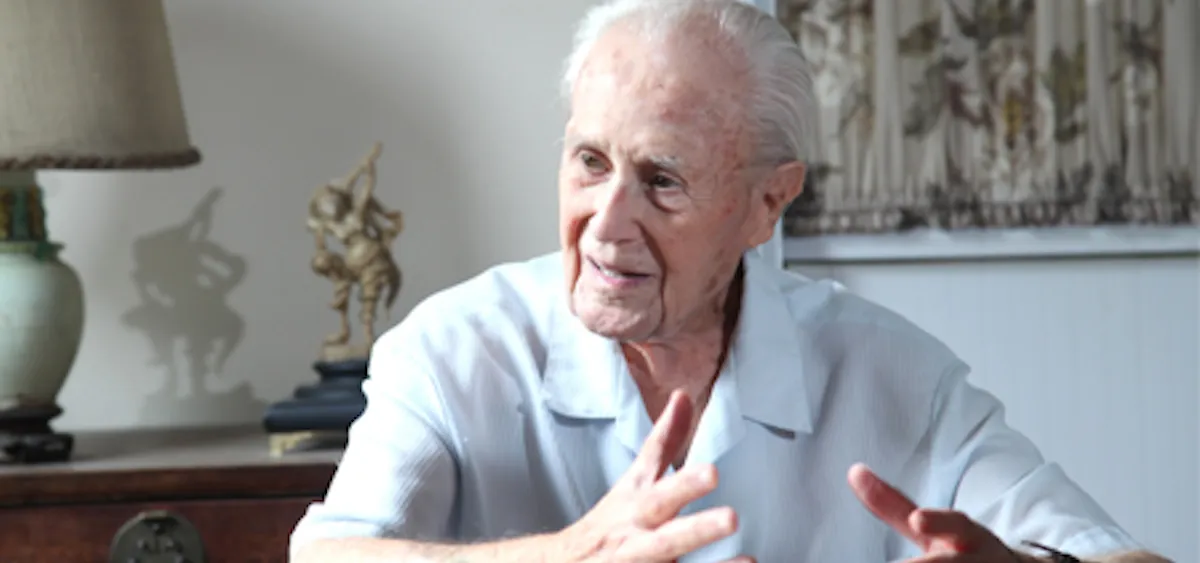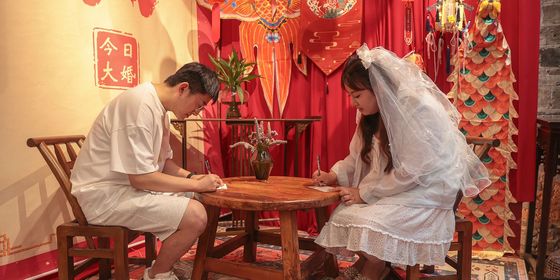Read part 3 of the saga about the translator who fooled Mao’s wife
In our November-December “Literature Issue,” we include a feature about literary translator Sidney Shapiro, who’s been living and working in China for over 60 years. Shapiro has lived a fascinating life and is even more of a character in person. In the accompanying blog series about Shapiro, I describe my experience getting in touch with the translator, and going to his house to interview him.
We stood in front of a great wooden door on Nanguanfang Hutong, a winding narrow street in the old Houhai neighborhood ofBeijing, shifting nervously from foot to foot. It was a hot afternoon in August, and sweat rolled down my back as I shifted a homemade apple pie from arm to arm. In my bag, lox and cream cheese sweated against my notebooks. We waited—me, my colleague Andy, and our photographer Tyler Jiang—laden with gifts like seekers on a spirit quest. We were here to interview Sidney Shapiro… and he wasn’t answering the door. I rang the bell once, twice. Nothing. Was it possible that we were too late? Had the 96-year-old translator keeled over in the shower?
But when I called his house phone, Shapiro answered on the second ring, sounding healthy and unconcerned.
“Hi, Mr. Shapiro. This is Liz from the World of Chinese,” I said.
“Yes, hello,” he said calmly.
“Um, we’re here at your house…”
“What!” he said. “I can’t hear you.”
“We’re at your house!”
“You’re at my house?” he shouted. “Outside my door? You’re here now?”
“I’m sorry,” I said. “I thought we said 3 o’clock…”
“Well I though we had scheduled the interview for May 2nd!”
For a moment, my internal calendar reeled—was it possible that I had gotten the wrong day?—and then righted itself. It was August.
“I thought we were scheduled for today,” I said. “But if today doesn’t work…”
Andy and Tyler gave me stricken looks. “The pie!” Andy muttered vehemently from the side of his mouth. “Tell him you have the pie!”
After a bit of negotiating, Shapiro finally relented and told us to come back in an hour.
I breathed a sigh of relief as we strolled back toward the Starbucks. After weeks of planning we were almost there, and it had been touch-and-go the whole time.
I had literally never spent so much time preparing for an interview. In addition to reading Shapiro’s autobiography, along with a slew of interviews and articles, I had committed myself to bringing along some American-style goodies—proffered to the ex-Brooklynite in a moment of desperation, when he seemed on the edge of bailing out of the interview.
So it was that I’d stayed up late the night before baking an apple pie, and spent the morning scouring Western grocery stores for bagels, lox and cream cheese. I’d spent the taxi-ride over sitting on the frozen lox, trying to get them to thaw. Now I started worrying that they would spoil in my bag. What if I killed Sidney Shapiro with raw fish? (The night before, I had expressed a similar sentiment about my pie to a friend, who answered callously, “That would make some story!”)
After an hour, we returned to Shapiro’s door. This time, we were greeted by a quiet, middle-aged Chinese woman who led us through a courtyard filled with flowers to the door of a stone house. “His hearing isn’t so good,” she said solemnly as she knocked on the door. Her demeanor was sobering. A vision rose in front of my eyes of a gnarled old man curled into a rocking chair, stamping his cane against the floor and demanding that we hurry it up already.
When the door finally swung open, we were hit by a blast of music. Before us stood a small white-haired man in a button-downOxfordshirt and shorts, beaming up at us. “You must be from the magazine!” he said, ushering us in. “Welcome, welcome,” he said in both English and Chinese. “I don’t know which language to speak.” He looked between me and our Chinese photographer.
The house was a spacious one-room, simply and tastefully decorated with a rug, comfortable wood furniture, wall hangings and a big-screen TV. Shapiro turned toward the television. “Do you know Leonard Cohen?” he shouted over the music. On the screen, the 60s-era counterculture bard was rocking out to Latin beats. “This is one of his live sessions,” Shapiro said. “I think it’s just wonderful. I like to play it really loud and do my taijiquan.”
The house was cool and surprisingly modern inside. It took us a few minutes of conversation to discover that the old-fashioned house was less than a year old—after living there for 50 years, Shapiro had seen his home razed and rebuilt. And he loved it.
“Isn’t it wonderful!” Shapiro exclaimed, stamping a slippered foot on the mock wood boards. “It stays warm in the winter. And these,” he patted the heaters affectionately. “No more carrying coal in. Imagine how much time—years—we wasted carrying coal!” He launched into a detailed explanation of how the heaters worked as we stood near the fridge, armed with bagels and pie.
This was far from the sharp, ascetic intellectual that the articles about him had suggested. For a man who’s lived inChinafor two-thirds of his life, Shapiro is still deeply American, albeit one with the slightly embarrassed hospitality of a Chinese. After offering us ice cream and fussing over whether we should eat the pie we’d brought him now or later, we finally settled into his dining table to talk about his life. “So,” Shapiro said, placing his hands on the table. “What is it that you want to know?”
Belying what I had come to think of as Sidney Shapiro’s complete badassery—to recap, his decision to move to China in the midst of a civil war, armed only with broken Chinese and $200 in cash—was what turned out to be his rather grandfatherly demeanor. He offered us ice cream, marveled over his new heater and talked for 20 minutes about his granddaughter Stella. (For the record, she married a nice Jewish boy and now resides in Beijing with her family.)
This mix of charming and exasperating carried over into our interview, as the 96-year-old translator continued to ignore the finer points of our questions, instead launching into whatever story he wanted to tell. Ironically, these ended up being the same anecdotes that filled his autobiography… which he had told us to read so that he wouldn’t have to repeat himself. About half of our exchanges went something like this:
Andy [fascinated]: “Asking an insightful question.”
Shapiro [indignant]: “Accusing Andy of not reading his book.”
Andy [wounded]: “Protesting repeatedly that he has read it, he really has!”
Accusations and repeated stories aside, Shapiro provided us with fascinating tales of China just before and after liberation, along with stories of his experiences as an American living in the tumultuous, heady days of Communist victory. He told stories pre-liberation Shanghai, when he was deputized by the American Consulate to talk Jewish refugees into seeking visas to countries other than the US. He told us of his and wife Fengzi’s daring attempt to escape to the Communist territories, right under the noses of murderous Guomindang forces (foiled, in the end, by Shapiro’s status as a foreigner). And he told us about his run-in with Arthur Miller in the 1970s, when the playwright interviewed Shapiro for an Atlantic article that Shapiro hated. (On Miller: “He infuriated me!”)
But the most fascinating of Shapiro’s stories took place during the Cultural Revolution, a period when his life almost completely fell apart. It was a slightly surreal experience, hearing Shapiro discuss the era with the careful, moderated tones of a good Maoist historian. Part of the reason he was able to do that is that Shapiro personally experienced no permanent damage from the Cultural Revolution, though it was, for him, a turbulent and terrifying time.
Unlike some of his unluckier friends and colleagues, Shapiro wasn’t punished for being a Westerner or intellectual; but his wife Fengzi was put under house arrest, thanks to a personal vendetta by Mao’s wife, Jiang Qing, while his only daughter was sent away to the countryside to do labor. It was during this time that Shapiro began work on the translation project that would put his name on the map: “Water Margin” (水浒传), a 14th century epic regarded as one of China’s Great Four Novels.
As I detail in the article, Shapiro soon found himself in hot water with Jiang Qing, who led the corrupt Gang of Four, and feared that Shapiro’s translation created an uncomfortable analogy: glorifying the anti-government bandits and decrying corruption.
In the interview, Shapiro cheerily told us about Jiang Qing’s attempts at intimidation, which included deploying “thugs” down to threaten Shapiro at work until he agreed to make the changes they wanted. Incredibly, he seemed to have no resentment about this, nor about his wife’s detention. It was hard for me to imagine how a man who had grown up with Western values and a Western political system could have accepted personal injustices of this kind. The answer came as our conversation shifted from Shapiro’s past to present-dayChina.
As I asked him about the current state of Chinese social and political values, the old man’s ire began to rise. He talked nostalgically of post-liberation days, of the pure intentions of the new Communist government and cooperative attitude among the Chinese public: “When I first came, the country was completely disintegrating,” he said. “All through the 19th century, there was a question among intellectuals of how to ‘save China’. And they tried everything… It wasn’t until something called the Communist Party came into existence that they began to work on really having a creed—a basic standard of values that would work.”
As we wound down the interview, political talk gave way to the kind of chatter you might hear at a church potluck, as Shapiro praised my apple pie and spoke more about his family. As we sopped up the last dregs of apple filling with our forks, Shapiro looked at me and said, “This pie is wonderful.”
“Thank you,” I said.
“Why, if I were 70 years younger, I’d make you my girlfriend!”
The next day, I received an email from Shapiro continuing our conversation about the current social and political state of China. The following is Shapiro’s opinion, and does not represent that of The World of Chinese:
“Did you ask how I thought China can get back on track? There’s a wonderful Chinese folk joke that has the answer. A professional matchmaker finds a beautiful girl for a nerdy boy everyone else has previously refused. The boy’s mother suspiciously says there must be something wrong. ‘A mere trifle,’ replies the matchmaker. ‘She’s only a teeny-weeny bit pregnant!’ Some of China’s leadership is knowingly tolerating a “teeny-weeny” bit of graft and corruption, of violation of the nation’s laws. This is very dangerous. Without law, the people are exploited, special interests rule, and there is chaos. The only solution is to restore the creed, the revolutionary stand, the world outlook which raised China in only a few decades from the depths of poverty and despair to its present position of one of the world’s leaders…”
Suddenly it all made sense—for Shapiro, Maoist thought and revolutionary values remain synonymous with the radical liberation and egalitarianism that he witnessed in 1949. It’s this commitment to the experiment of New China—and the deep emotional imprint that liberation left on him—that continues to drive Shapiro today. I felt as though I had cracked the case. Sidney Shapiro: China’s last revolutionary.












